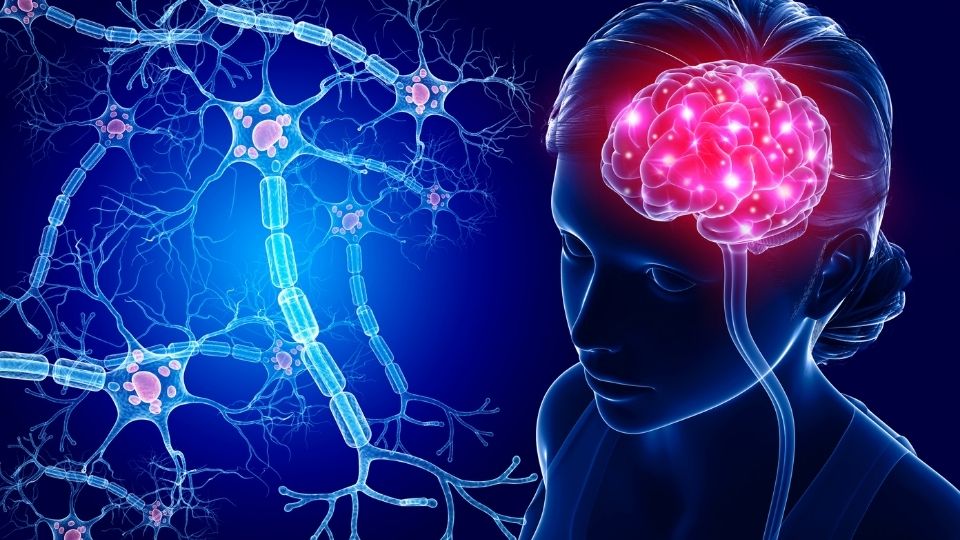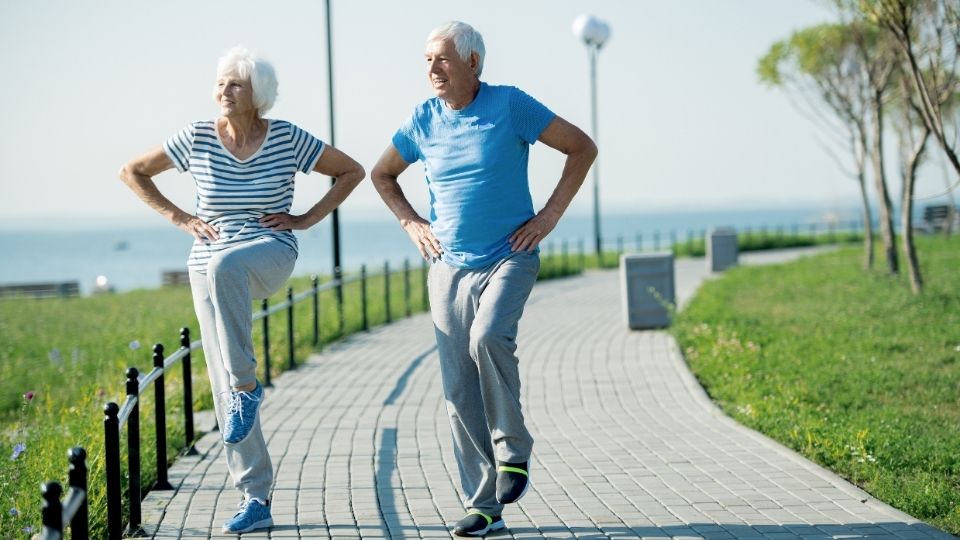|
A Healthy Brain: Use It or Lose It!
down Main Street in a town without a lot of side streets vs. a town with more side streets, and therefore, more options to get around the accident. Pathways in the brain operate under the same principle: A brain with more pathways between the cells, offers more opportunities for the cells to communicate with each other. When there is small damage on one pathway, the brain has alternative options to continue sending the brain signals via another route. If you want strong muscles, you need to do a lot of physical activity, like regular exercise, strength training, or weight lifting. “Use it or lose it” is a phrase that refers to building and maintaining strong muscles. But what about your brain? The brain is not a muscle – it is not made of muscle fibers. Instead, it is made of many smaller brain cells called neurons. These neurons send signals to one other, and communicate with one another, through chemicals called neurotransmitters. Even though the brain cells are not muscle fibers, brains cells also operate under the same general principle: Use it, or lose it. If a brain cell is not used, or does not communicate with the cell next door, that brain cell loses its function. Cognitive ReserveThe “cognitive reserve” hypothesis suggests that a very healthy, “high capacity” brain – a brain with high cognitive reserve – is one where there are a lot of healthy brain cells, and those brain cells have a lot of connections with one another. A brain with low cognitive reserve does not have as many connections between brain cells, and likely has fewer healthy cells (Harrison et al., 2015). So, why do we need high cognitive reserve? Let’s draw the analogy of running an errand (Figure 1). You need to get your car from Point A (at the north end of town) to Point B (at the south end of town). Typically, when you run this errand you use Main Street., because it is a common, easily accessible route. Now imagine that Main Street is shut down for a traffic accident. If you are in a town without a very well connected road system, you may just have to sit on Main Street until the accident is cleared, because you don’t have any other options. Now imagine that you live in a town with many roads, and these roads are all connected together in a grid. In this more connected town, you would not need to sit in traffic. You could still get to Point B, because you could take an alternative route – you have multiple travel options. The brain works in a similar way. If it is trying to send a signal from one area to another, and for some reason there is a problem sending that message the typical way, a well-connected brain (one with high cognitive reserve) will have lots of other routes (what scientists call neural pathways) available to take, and the signal can still reach its destination. A well-connected brain has more “resilience” against damage – it can handle more damage than a brain with fewer alternate routes around the damaged areas (Stern, 2012). Building Cognitive Reserve through Brain ActivitiesIn order to build connections between brain cells, and increase the connections between existing brain cells, you need to use the cells to establish the connection, and then keep using the cells, to maintain that connection. Regular use of “brain stimulating activities” is actually building a healthier brain: people with more intellectually stimulating jobs or leisure activities are continually building new brain connections, and using existing brain connections in their everyday life (Andel, Vigen, Mack, Clark, & Gatz, 2006; Fritsch et al., 2001; Stern, Albert, Tang, & Tsai, 1999). Even if you don’t live or work in an intellectually stimulating environment, you can still build your own cognitive reserve, by challenging your brain: Learning new information, and processing that information on a deeper level. Watch a documentary and discuss it with a friend. Read books or articles in a new genre – if you like mysteries, try non-fiction. If you usually read magazines, try reading a short story. Even if it is not your first choice, remember you are trying something new because you are challenging your brain. Attend lectures or guest speakers in your area on topics that interest you – your library or Extension office should have a calendar or list of what’s free. Trying existing activities in a new way. Brush your teeth with the opposite hand – it makes your brain work harder than you might think! Try learning about, and then trying a new cooking technique – have you heard of cooking sous vide? If not, look it up! Have you tried cooking with spices from another culture? The learning process, and the trying process, can be a good challenge for your brain, and the reward may be tasty. Stimulate your senses with new environments – see, hear, and smell things that are new to you If you normally go to the movies, why not try a play, or an opera? Listen to a new radio station – even if the music on the new station isn’t typically what you prefer, you can think about the differences you hear in the music styles, and you can even discuss with someone why certain styles are more or less appealing to you. Maybe you will discover a new area of music that you enjoy Go for a walk on a new route – see a new neighborhood in your area. Instead of walking around your own block, why not drive to a new spot and start your walk from there? Don’t forget to tell people where you are going and to bring a map! Try a new, and challenging skill Learn a new language – or even just basic greetings in several languages – the internet can get you started. For example, “Thank you”: In Japanese, it is written as ありがとう, and pronounced as “Arigato” (Ar – ih – ga – toh). Practice writing it, and saying it. In Icelandic, thank you is “Takk” In Hebrew, thank you is “Toda” (toh-dah), See how many more you can find and memorize, Find a friend that can teach you a new card game, Try a new instrument – videos on the internet can be a great way to teach yourself from home, if you don’t want to attend a lesson, Really, anything that you find to be intellectually challenging, is likely causing the growth of new neural connections, or building existing connections to be more efficient. Using your brain in new ways is building up your cognitive reserve. Take Care of Your Brain by Taking Care of Your Heart and Blood VesselsBrain health is not just created by participating in new or intellectually stimulating activities. You should also practice healthy behaviors that help bring oxygen to the brain. Oxygen is carried to the brain by blood vessels, and you can keep these blood vessels in working order through healthy diet, maintaining your blood pressure, and adhering to any other heart-healthy practices, as recommended by your doctor. Exercise also helps the brain by increasing the flow of blood and oxygen (Henderson, 2014). In general, what is good for your heart, is also good for your brain. Higher Cognitive Reserve Protects against Alzheimer’s Disease and Other DementiasBuilding up cognitive reserve may pay off in late life, by slowing declines in memory, and by reducing your risk of Alzheimer’s disease and dementia (Wilson et al., 2003; Whalley, Deary, Appleton, & Starr, 2004). Scientists think it does so by offering the brain more opportunities to get the brain signals where they need to go, even when damage has started from the very early stages of the disease (Akbaraly et al., 2009; Scarmeas & Stern, 2003; Wilson et al., 2002). Let’s revisit the traffic jam example. If very early Alzheimer’s disease is causing damage to certain routes, or neural pathways in the brain, and if this brain already had low cognitive reserve – that is, there were not a lot of healthy connections to begin with -- the symptoms of memory loss and trouble with daily tasks will be noticeable much earlier because the brain doesn’t have alternative options to get those signals sent around the damaged areas. In a brain with high cognitive reserve – the person had a very well-connected brain already – the brain may be able to work around the part with the early Alzheimer’s damage, and symptoms may be kept at bay for a longer time. SummaryChallenging your muscles makes for strong healthy muscles, and challenging your brain cells makes for a strong healthy brain. Build up your brain’s cognitive reserve – create a well-connected, highcapacity brain – through overall healthy behaviors (diet and exercise) and making mentally challenging activities part of your daily life. The more options your brain has to get its signals sent, the better able it is to handle areas of damage. A well-connected brain may be better able to delay or prevent diseases like Alzheimer’s. Chances are that these mentally challenging activities will also make your life fun and interesting, as well. ReferencesAkbaraly, T. N., Portet, F., Fustinoni, S., Dartigues, J. F., Artero, S., Rouaud, O., & Berr, C. (2009). Leisure activities and the risk of dementia in the elderly: Results from the Three-City Study. Neurology, 73, 854-861. Andel, R., Vigen, C., Mack, W. J., Clark, L. J., Gatz, M. (2006). The effect of education and occupational complexity on rate of cognitive decline in Alzheimer's patients. Journal of the International Neuropsychological Society, 12, 147-152. Fritsch, T., McClendon, M. J., Smyth, K. A., Lerner, A. J., Chen, C. H., Petot, G. J., & Friedland, R. P. (2001). Effects of educational attainment on the clinical expression of Alzheimer's disease: Results from a research registry. American Journal of Alzheimer's Disease and Other Dementias, 16, 369-376. Harrison, S.L., Sajjad, A, Bramer, W. M., Ikram, M. A., Tiemeir, H., & Stephan, B. C. (2015). Exploring strategies to operationalize cognitive reserve: A systematic review of reviews. Journal of Clinical and Experimental Neuropsychology, 37(3), 253-264. Henderson, V.W., (2014). Three midlife strategies to prevent cognitive impairment due to Alzheimer's disease. Climacteric: The Journal of the International Menopause Society, 17 Suppl 2, 38-46. Scarmeas, N. & Stern, Y. (2003). Cognitive reserve and lifestyle. Journal of Clinical and Experimental Neuropsychology, 25, 625-633. Stern, Y., Albert, S., Tang, M., & Tsai, W. (1999). Rate of memory decline in AD is related to education and occupation: Cognitive reserve? Neurology, 53, 1942-1947. Stern, Y. (2012). Cognitive reserve in ageing and Alzheimer’s disease. Lancet Neurology, 11(11), 1006–1012. Whalley, L. J., Deary, I. J., Appleton, C. L., & Starr, J. M. (2004). Cognitive reserve and the neurobiology of cognitive aging. Ageing Research Reviews, 3(4), 369-382. Wilson, R. S., de Leon, C. F. M., Barnes, L. L., Schneider, J. A., Bienias, J. L., Evans, D. A., & Bennett, D. A. (2002). Participation in cognitively stimulating activities and risk of incident Alzheimer disease. JAMA, 287, 742– 748. AuthorsElizabeth B. Fauth and Maria C. Norton Related Research
If you want strong muscles, you need to do a lot of physical activity, like regular exercise, strength training, or weight lifting. “Use it or lose it” is a phrase that refers to building and maintaining strong muscles.
As the human body ages, so does the brain, even with normal healthy aging. Some older adults may begin to notice that it is now taking a little longer to learn new things, or they have become a little forgetful. They may misplace things like keys or glass
There has long been a debate as to whether most of the factors that make us who we are come from genetic or environmental influences—the so-called “nature vs. nurture” debate. Scientists seem to agree that both genetic influences (what we’re born with) AN
Dementia is not a term that refers to just one disease (Alzheimer’s Association, 2016). The term dementia is a label for a number of symptoms related to the loss of cognitive (brain) function. Symptoms include a decline in memory or other thinking and pro
Having the occasional period of feeling sad or blue, which then resolves on its own is a normal part of life and is not considered depression. When symptoms become more common, or more intense, however they should not be ignored. A physician, psychiatrist
Life is full of challenges and most of us will experience occasional periods of sadness. However, prolonged sadness coupled with other symptoms such as difficulty concentrating, feelings of guilt, loss of interest in things that used to produce pleasure,
When loved ones develop Alzheimer’s disease or another kind of dementia, spouses and other family members often assist with daily needs, like driving, shopping, and eventually even personal care (feeding, bathing, and dressing). Family care arrangements a
Stress as a normal part of life. None of us gets through life without stress. “Stress” is how the human body and mind respond to anything that creates some kind of threat or danger (Selye, 1956). There are many kinds of events or experiences in our lives (责任编辑:) |









